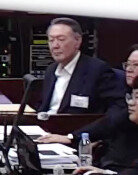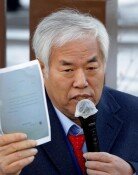Stock Market: Year Low
The Korean stock market is virtually on the point of death. The stock market is unable to rise from its stagnation since capital investment to the stock market is draining, the decrease in transactions is deepening, and negative events from outside of Korea, such as a hike in oil prices and threats of terrorist attacks, are happening.
Some analysts even point out that it is meaningless to offer an outlook for the KOSDAQ market, which is almost breaking its own all-time low record daily.
Investors Who are Beyond Despair and Became Indifferent
What meaning does it have that the KOSDAQ hit the lowest point of this year? People say that it is going to fall even more, said one of the 10 customers at the headquarters of Daishin Securities, located in Yeoido, Seoul, August 2. They shook their heads, while ignoring the electronic board, which was dominantly green, the green color indicating that stocks were falling. Their expressions showed frustration, for the stock market was still weak, caused mainly by the delay in resuscitating Korean domestic consumption. Mr. Kim, 36, an office worker cried out irritatedly, The companies are said to be doing fine, but why is the stock market still down?
Branch manager of the SK Securities Jongro, Park Yong-sung, said, Maybe the business slump has continued for so long, that even under these bad circumstances, people now accept it as normal. Hyun Joo-mi, Songpa branch manager of Good Morning-Shinhan Securities, commented, Investors know by now that under such conditions, a rally in the stock market is not easy.
The future prospect of the stock market is also blurry. Kang Shin-woo, managing director at PCA Investment Trust Management Company, predicted, There is the possibility that the KOSPI might fall until the 670 point level, and a rally in stocks will likely be possible next year, when expectations are high on the recovery of domestic consumption.
Hannuri Investments and Securities Director Park Yeon-chae said, The stock market will probably stop falling around 700 and will hover around that zone for a long period. I want to hope for the possibility of a rebound around November of this year.
Aversion of Domestic Investors is a More Serious Problem than Foreigners
With the possibility of exports, which were the driving force behind the stock market early this year, slowing down in the second half, investors are less declined to invest. Nevertheless, in the middle of a weak stock market, foreign investors are buying little or watching rather than selling. When the stock market hit the lowest point of this year, about two weeks ago, the foreigners went ahead and bought over 120 billion won worth of stocks. In other words, they went for the bargain-priced stocks. In fact, foreign investors only sold 2.6 trillion won during the two to three weeks after the Chinese shock in April, and that was conducted mainly by European hedge funds: afterwards, they are waiting and seeing. So far this year, although foreign investors net-purchases have decreased significantly since May, they are still purchasing more than selling.
Seoul Stocks Head of Investment Strategy Team Park Seung-won said, Long-term investment funds, mainly from the U.S., still prefer Korean stock in aspects of profitability and dividends.
Individual investors and domestic investment companies, however, are avoiding the stock market. Until this point of the year, about 1.464 trillion won was drained out of the stock market by stock investment funds (funds investing over 60 percent in stocks). Stock deposit money, which is the capital of individual investors, has also decreased by 1.014 trillion won, when compared to late last year.
Park analyzed, I think the current governments economic policy of going back and forth, along with societys cynical view on the rich, is pressuring the big investors to avoid the stock market.
Kang-Woon Lee Jae-Seong Hwang kwoon90@donga.com jsonhng@donga.com







